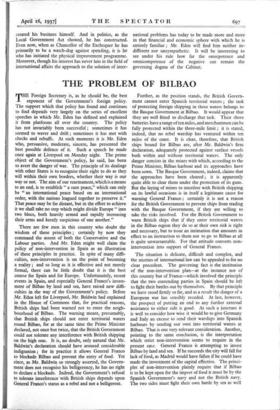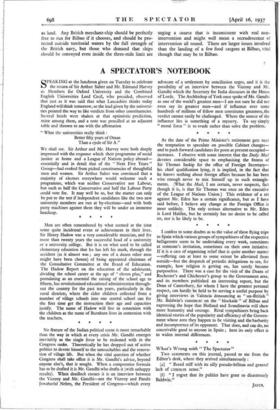THE PROBLEM OF BILBAO
THE Foreign Secretary is, as he should be, the best exponent of the Government's foreign policy. The support which that policy has found and continues to find depends very largely on the series of excellent speeches in which Mr. Eden has defined and explained it from platforms all over the country. The policy has not invariably been successful ; sometimes it has seemed to waver and drift ; sometimes it has met with checks and rebuffs. At such moments it is Mr. Eden who, persuasive, moderate, sincere, has presented the best possible defence of it. Such a speech he made once again at Liverpool on Monday night. The prime object of the Government's policy, he said, has been to avert the danger of war. The principle of its dealings with other States is to recognise their right to do as they will within their own borders, whether their way is our way or not. The aim of our rearmament, which is a means to an end, is to establish " a sure peace," which can only be " an international peace based on an international order, with the nations leagued together to preserve it." That peace may be far distant, but in the effort to achieve it we shall take no step which might divide Europe " into two blocs, both heavily armed and rapidly increasing their arms and keenly suspicious of one another."
There are few men in this country who doubt the wisdom of these principles ; certainly by now they command the assent of both the Conservative and the Labour parties. And Mr. Eden might well claim the policy of non-intervention in Spain as an illustration of these principles in practice. In spite of many diffi- culties, non-intervention is on the point of becoming a reality ; and so long as it is effective and not merely formal, there can be little doubt that it is the best course for Spain and for Europe. Unfortunately, recent events in Spain, and especially General Franco's invest- ment of Bilbao by land and sea, have raised new diffi- culties in the way of the Government's policy. Before Mr. Eden left for Liverpool, Mr. Baldwin had explained in the House of Commons that, for practical reasons, British ships had been warned not to enter the neigh- bourhood of Bilbao. The warning meant, presumably, that British ships should not enter territorial waters round Bilbao, for at the same time the Prime Minister declared, not once but twice, that the British Government could not tolerate any interference with British shipping on the high seas. It is, no doubt, only natural that Mr. Baldwin's declaration should have aroused considerable indignation ; for in practice it allows General Franco to blockade Bilbao and prevent the entry of food. Yet since, as Mr. Baldwin so strongly asserted, the Govern- ment does not recognise his belligerency, he has no right to declare a blockade. Indeed, the Government's refusal to tolerate interference with British ships depends upon General Franco's status as a rebel and not a belligerent. Further, as the position stands, the British Govern- ment cannot enter Spanish territorial waters ; the task of protecting foreign shipping in those waters belongs to the Basque Government at Bilbao. It would appear that they are well fitted to discharge that task. Their shore batteries have a range often miles, and merchantmen can be fully protected within the three-mile limit ; it is stated, indeed, that no rebel warship has ventured within ten miles of the coast. It is clear, therefore, that British ships bound for Bilbao are, after Mr. Baldwin's firm declaration, adequately protected against surface vessels both within and without territorial waters. The only danger consists in the mines with which, according to the Prime Minister, Bilbao harbour and its approaches have been sown. The Basque Government, indeed, claims that the approaches have been cleared ; it is apparently quite able to clear them under the protection of its guns. But the laying of mines to interfere with British shipping on its lawful occasions is in itself a legitimate cause for warning General Franco ; certainly it is not a reason for the British Government to prevent ships from trading with the Basque Government, if they are willing to take the risks involved. For the British Government to warn British ships that if they enter territorial waters in the Bilbao region they do so at their own risk is right and necessary, but to issue an intimation that amounts in effect to an instruction to them not to go to Bilbao at all is quite unwarrantable. For that attitude converts non- intervention into support of General Franco.
The situation is delicate, difficult and complex, and the niceties of international law can be appealed to for no clear precedent. The governing fact is the institution of the non-intervention plan—at the instance not of this country but of France—which involved the principle that the two contending parties in Spain should be left to fight their battles out by themselves. By that principle we have stood firmly so far, and as a result the danger of a European war has sensibly receded. At last, however, the prospect of putting an end to any further external assistance to either side is good. At such a juncture it is well to consider how wise it would be to give Germany and Italy an excuse to send their warships into Spanish harbours by sending our own into territorial waters at Bilbao. That is one very relevant consideration. Another, pointing to the same conclusion, is the interpretation which strict non-intervention seems to require in the present case. General Franco is attempting to invest Bilbao by land and sea. If he succeeds the city will fall for lack of food, as Madrid would have fallen if he could have made the investment of the capital effective. The princi- ples of non-intervention plainly require that if Bilbao is to be kept open for the import of food it must be by the Spanish Government's navy and not the British navy. The two sides must fight their own battle by sea as well as land. Any British merchant-ship should be perfectly free to run for Bilbao if it chooses, and should be pro- tected outside territorial waters by the full strength of the British navy, but those who demand that ships should be convoyed even inside the three-mile limit are urging a course that is inconsistent with real non- intervention and might well mean a recrudescence of intervention all round. There are larger issues involved than the landing of a few food cargoes at Bilbao, vital though that may be to Bilbao.























































 Previous page
Previous page